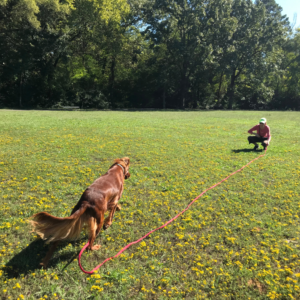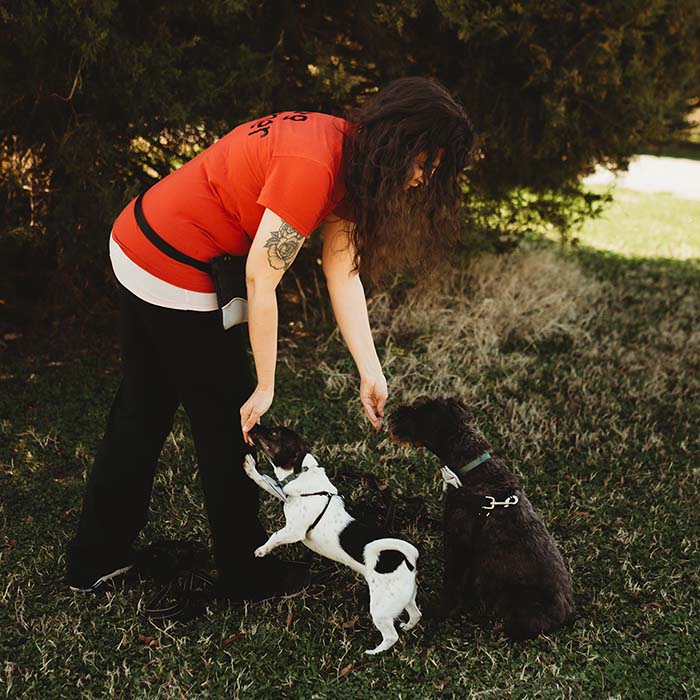Beyond Finding Homes: Rescue in Arkansas
A repurposed three-part series
This was originally intended as content for the upcoming WoofCat Magazine, which has been delayed indefinitely due to COVID-19. Follow WoofCat on Instagram, Facebook, or their website to get updates. See the article and podcast episode I recorded with Nicole about WoofCat here.
The dogs that Lori Miller helps aren’t always homeless. Sometimes they aren’t even dogs, like the donkey she encountered recently.
Lori founded her nonprofit, Arkansas Animal Alliance (AAA), in 2015. She’d started her rescue work in 2009, while working with Maumelle Friends of the Animals. She was living in Maumelle and volunteered on the MFOA board as the treasurer. She fostered and assisted with adoptions until moving outside of the city limits and too far to continue with the nonprofit. “My passion was to try to rescue animals that were outside the city limits and didn’t really have anywhere to go,” she explained. “That’s when I went ahead and started my own rescue to focus on that. I’ll do some owner surrenders but most of ours are picked up, just strays off the street and most are in Faulkner County.”

Sometimes issues pop after AAA has accepted a dog into the rescue. “We pick them up and I don’t know what health issues they’re going to have when I take them on, either,” Lori said. “A lot end up with heartworms and other parasites.”
There was one rescue that looked as though she had mange, but she ended up having a compromised immune system that required injections and medications to maintain. It’s challenging to put a limit on the financial cost of helping a dog before choosing euthanasia. “Our next step is to get her to the dermatologist,” Lori shared. “Once you put so much into a dog, unless their quality of life is compromised, it’s hard to euthanize a dog just because it’s costing you a little money. That’s hard for a rescue. A lot of dogs here in the south will have heartworms and that gets really costly to treat, not to mention the ones having health issues on top of that.”
AAA also seeks to helps dogs across central Arkansas, as Lori sees rescue as more than picking up a stray dog and finding a home. Lori incorporates spay and neuter, education, and other health assistance into her work. “If they don’t want to rehome you can’t make them rehome it, but their dog or cat is not sterilized, you can at least help it get sterilized and current on vaccinations so they don’t continue being a hoarder with all of these unwanted puppies or kittens,” Lori said. “Sometimes that’s rescue.”
There are also some misconceptions about spaying and neutering animals that Lori comes across. “People may have this idea in their head that, ‘My dog or cat should have one litter first,’” she explained. “You hear that a lot when you try to offer spay or neuter. You have it with guys a lot that they don’t want to neuter their male dogs. Sometimes education can go a long way. You can stop prostate issues if you neuter a dog. The highest cause of death in male dogs is that if they aren’t neutered and then they get hit by a car because they’re out chasing another dog. Maybe they don’t get run over but they run off because they’re looking for a dog in heat and they don’t come back.”
With no regulation, mainstream education, and few laws, there are often dogs and cats who don’t get health care at all.
There aren’t many animal welfare laws in general in Arkansas, and the rabies vaccination is the only vaccination legally required. Lori has seen Facebook used as a place for questions when a dog is bleeding or needs other medical care. The issues are compounded by a lack of shelter in Faulkner County. “If a dog is picked up, there is no animal shelter,” Lori said. “Unless a good samaritan decides to take on the responsibility of a dog, whether a rescue or an individual, no one is going to pick up that dog, which means it will continue to have puppies, it could end up having rabies. There are numerous things. What people don’t realize about the areas where there is not an animal shelter, if you report, for instance, to the Faulkner County Sheriff Office, if you report that your neighbor is beating their dog, then the deputy can go to that house and confront them, but they literally have no place to the dog in order to remove it from that abusive situation. They tell them, ‘Quit beating your dog or I’m going to take it,’ but the deputy doesn’t want to take the dog because there is no place to take it.”
But there are some resources available in central Arkansas:
Arkansans for Animals
Companions Spay & Neuter Clinic
Humane Society of Saline County
“They all stay kind of pretty booked, so it’s difficult to even get our rescue dogs into one of those,” Lori shared. She found Out West Veterinary Center and Urgent Care in Conway, which offers rescue organizations the same prices as Companions.
Since she rescues across Arkansas, she’s found that most of the areas she assists, don’t have a low-cost clinic. “There is maybe one vet and because there is one vet, he or she is not competing for any other business, so they can charge whatever they want and they won’t even give a rescue a discount a lot of times,” Lori said. “The rural areas are the ones who need the low-cost spay and neuter more than the bigger cities and yet they don’t have access to it. They’re the same areas you can’t really charge too much of an adoption fee for those dogs if you adopt them out there locally. You’re not breaking even getting a dog vetted and getting an adoption fee. You’re going in the hole every time.”

Like some other rescues in central Arkansas, AAA utilizes foster homes. There are no outside pens or shelter structures, although some rescues do use kenneling to house up to 50 or 60 animals. But even with smaller numbers, Lori does have a few animals that are with her for the long haul. A vet had asked her to take in a purebred border collie, with papers, who had been used for breeding. ”His owner wanted him euthanized because he had heartworms and he didn’t want to pay for heartworm treatment,” Lori explained. “I couldn’t let him get euthanized for that.”
But without a foster home lined up, the dog went into boarding, which adds up quickly. When he finished the heartworm treatment, he was supposed to be neutered when they discovered a growth in his abominable area, which was discovered to be a mass on his spleen. “Now, I’ve paid for heartworm treatment for this dog and boarding, and now I have to pay for this mass,” Lori said. “Thankfully, it’s not cancer, but I’ll get a $150 adoption fee on this dog and I’ve got thousands in him.”
There have been other dogs with cancer that the rescue has helped, and even a few who were needlessly suffering that did need to be euthanized. “With rescue, when they take on a dog, you don’t know how long you’re going to have them sometimes because you don’t know what health issues they will have when you take them on,” Lori said. “We’ve had to euthanize a few that were suffering and we didn’t see an end in sight so we’ve had to make that call. We can’t euthanize due to money, but we don’t have the money. It’s a double-edged sword.”
Find more about Arkansas Animal Alliance at their website or Facebook page. This was originally intended to be a part of a larger article as content for the upcoming WoofCat Magazine, which has been delayed indefinitely due to COVID-19. Follow WoofCat on Instagram, Facebook, or their website to get updates. See the article and podcast episode I recorded with Nicole about WoofCat here. Telltail Dog Training offers group classes and private in-home lessons in the Little Rock area, along with training walks for current clients. Find Telltail’s podcast here, or find additional information on Instagram, Facebook and YouTube.




